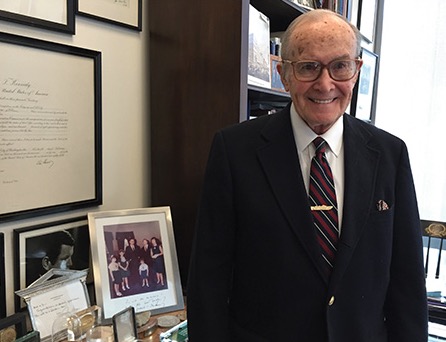‘Wasteland’ Revisited

The smarter way to stay on top of broadcasting and cable industry. Sign up below
You are now subscribed
Your newsletter sign-up was successful
Former FCC chairman Newton Minowonly served as FCC Chairman for two and a half years, but he may be the TV industry’s most famous (or infamous) regulator. That reputation is due to his “vast wasteland” speech at the 1961 National Association of Broadcasters convention in Washington. That speech, and that phrase, has remained stuck in the public consciousness—and in broadcasters’ collective craw—for more than half a century.
But Minow was also instrumental in early testing of the pay-TV business and creating noncommercial television, and advocated for a nonpolitical commission, something that seems a distant memory at a time when political fissures appear to widen with every big vote at today’s FCC. And he is considered one of the founding fathers of televised political debates.
Minow, who turned 90 years old earlier this year, still commutes three days a week to law firm Sidley Austin in Chicago’s downtown Loop. His office is still filled with mementos from his D.C. tenure, pictures of himself with former presidents and more treasured ones of his burgeoning family. A TV in the corner helps him keep up with the news...unless it is summertime, when thoughts (and channels) turn to his beloved Cubs baseball team. Warm weather used to mean golf, but he hung up his clubs a couple of years ago.
A member of the board of directors of the Commission on Presidential Debates, Minow has once again plugged back into the media zeitgeist in an election year unlike any other. He has long been a driving force in the creation and refinement of televised presidential debates—those between the eventual party choices, not the current round of nominee debates that have become the center of so much media attention of late. Minow calls these initial scrums “deplorable,” though he does see promise in the town hall format.
Looking back to his moment in the spotlight, the one people still readily quote 55 years after the fact, Minow maintains that he came not to bury the medium back in 1961, but—at least in some fashion—to praise it. Among the less-remembered passages from that speech is this one: “It may also come as a surprise to some of you, but I want you to know that you have my admiration and my respect.” But that overture was followed by a stern critique that called the emerging medium to the better angels of its programming nature. The fault, he said, lay in a medium whose programmers had become enamored of the novelty of television and had saturated the airwaves with cowboys and Indians, cops and robbers and, well, more cowboys and Indians and cops and robbers. It was a medium he felt offered so much more promise than was being delivered. B&C bore witness to the predictably angry reaction of broadcasters.
The former chairman spoke with B&C Washington bureau chief John Eggerton about those and many other topics, including a decades-long rift with the magazine. Minow says he used to read Broadcasting magazine (the forerunner to B&C) before he joined the FCC, but stopped reading it after the editorial page excoriated the Peabody Awards Committee for giving him an award.
You are still a member of the Commission on Presidential Debates, correct?
The smarter way to stay on top of broadcasting and cable industry. Sign up below
I have been on it from the beginning. [CBS president] Frank Stanton had a great deal to do with this. I was involved in the 1960 [Kennedy-Nixon] debates before I went to the FCC.
I was a law partner of Adlai Stevenson [who ran unsuccessfully for president]. Stevenson had written an article calling for some kind of televised debates in future presidential campaigns and Congress was considering at the same time what do to about Sec. 315 [the equal time rule] because broadcasters were pushing Congress to allow debates. Stevenson was asked to testify before the senate and as the junior member of the law firm I was given the job of developing his testimony. The end result was that Congress suspended 315 for the 1960 presidential election, which led to the Kennedy/Nixon debates. My college roommate, Sandy Vanocur, then the NBC White House correspondent, is the only other person from those debates still living.
To read B&C’s full Q&A with Minow, click here. (Subscription required.)
Contributing editor John Eggerton has been an editor and/or writer on media regulation, legislation and policy for over four decades, including covering the FCC, FTC, Congress, the major media trade associations, and the federal courts. In addition to Multichannel News and Broadcasting + Cable, his work has appeared in Radio World, TV Technology, TV Fax, This Week in Consumer Electronics, Variety and the Encyclopedia Britannica.

